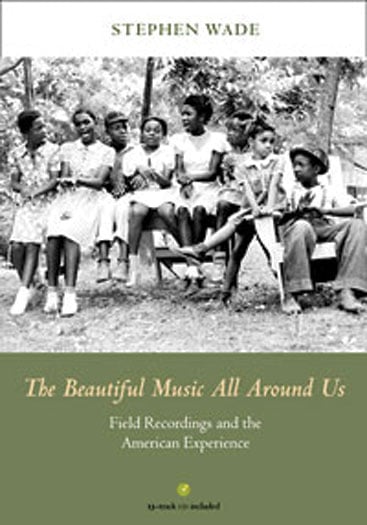THE BEAUTIFUL MUSIC ALL AROUND US: FIELD RECORDINGS AND THE AMERICAN EXPERIENCE—BY STEPHEN WADE
 THE BEAUTIFUL MUSIC ALL AROUND US: FIELD RECORDINGS AND THE AMERICAN EXPERIENCE—BY STEPHEN WADE—University of Illinois Press 9780252036880. Clothbound, 504 pp., b&w photos, 13-track CD included, $24.95. (Univ. Of Illinois Press, 1325 S. Oak St., MC-566, Champaign, IL 61820, press.uillinois.edu.)
THE BEAUTIFUL MUSIC ALL AROUND US: FIELD RECORDINGS AND THE AMERICAN EXPERIENCE—BY STEPHEN WADE—University of Illinois Press 9780252036880. Clothbound, 504 pp., b&w photos, 13-track CD included, $24.95. (Univ. Of Illinois Press, 1325 S. Oak St., MC-566, Champaign, IL 61820, press.uillinois.edu.)
Banjo player Stephen Wade, who is also an actor (Banjo Dancing), writer, researcher, and historian, put all these myriad talents to work during the 16 years it took him to pull together this richly documented opus, The Beautiful Music All Around Us: Field Recordings And The American Experience. Here Stephen presents the “backstories” of 13 numbers that were captured in field recordings for the Library of Congress between 1934 and 1942. He has also ferreted out the life-stories of the performers, interviewing family members and friends at great length and incorporating their first-person recollections into his lively narrative.
Since most of these musicians were unfamiliar to me, my initial attachment to the book came from the songs on the accompanying CD: “Bonaparte’s Retreat” (fiddler Bill Stepp), “Soldier’s Joy” (a spirited banjo-mandolin version by the Nashville Washboard Band), “One Morning In May” (Texas Gladden), “Another Man Done Gone” (Vera Hall), “Diamond Joe” (Charlie Butler), and “Goodbye, Old Paint” (Jess Morris). Later, I came to love songs and voices I had never heard, particularly those of 12-year-old Ora Dell Graham, “a little black girl from Mississippi” (as her nephew describes her), who sings “Shortenin’ Bread” and the pulsing “Pullin’ The Skiff.”
Slowly, I became entranced with the lives of these musicians whose stories Stephen tells with riveting detail. Banjo player and coal miner Pete Steele (“Coal Creek March”) had decided to move his young family north from Kentucky. Crossing a bridge, their truck hit a car head on and his wife Lillie’s pelvis was split. Right there at the bridge, they were befriended by an “angel,” the wife of a rich manufacturer, who became a lifelong friend and who was able, through her husband, to later provide permanent employment to Pete and his children. “That wreck was the best thing that happened to me,” said son Bob.
Then there are the stories behind the songs. Who could have guessed that “Rock Island Line,” sung here by convict Kelly Pace and fellow inmates, was initially composed by an engine wiper for the Rock Island Railroad line as part of a “booster” program for the company?
Stephen presents an enormous amount of material here and, yes, it often gets complicated, especially when he is detailing the history of a song, but he keeps his writing clean and clean even if—to paraphrase Earl Scruggs—“that’s a lot of words.” If you dip in a little at a time, you will be richly rewarded. High praise for this gorgeous work! MHH
